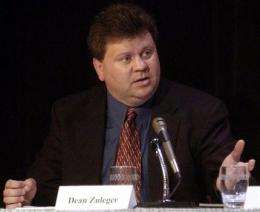Wis. paper faces backlash for outing Web critic

(AP) -- Getting named the local paper's Person of the Year was supposed to be an honor for small-town politician Dean Zuleger. But the award only enraged many townspeople.
Readers anonymously flooded the Wausau Daily Herald's Web site with comments bashing Zuleger's salary, his management style, his weight. One person suggested his third chin should have been nominated.
"I have just two words for Dean Zuleger, and they are ... A) anger management. B) salad bar. C) Rod Blagojevich. D) all of the above. The correct answer is D.," one posting read.
Zuleger, administrator of the Wausau suburb of Weston, demanded to know who was saying all those nasty things about him, and the paper did something unusual: It handed over one critic's e-mail address. The politician then sent a letter on official stationery telling the commenter, businessman Paul Klocko, to stop the personal attacks and "come out from behind the cloak" and meet him.
The episode has added fuel to the debate over anonymity on the Internet and how far readers who aren't willing to use their names should be allowed to go.
The paper has since apologized for turning over the address, and its corporate parent, Gannett Co., has clarified its policies on anonymous speech. The paper will now release information only if ordered by a court or if a comment contains a threat of imminent harm.
Lawsuits have been popping up across the country involving anonymous online speech. Richard Ottinger, a former New York congressman, succeeded in unmasking a reader who accused him of corruption in having his home renovated. A judge ordered a newspaper to turn over identifying information. But another judge recently threw out Ottinger's $1.5 million defamation suit against the reader.
A couple sued a newspaper in Ottawa, Ill., to learn the identity of a commenter who accused them of bribing authorities to try to win approval to convert their home into a bed and breakfast. A judge tossed the case out.
"We're seeing a flood of cases involving anonymous comments," said David Ardia, director of the Citizen Media Law Project at Harvard Law School.
Most of the cases fail because statements of opinion are protected under the First Amendment. Courts are requiring officials to show they have a legitimate defamation claim - that is, one involving a false assertion of fact that hurts someone's reputation.
What was rare and surprising in the Wausau case was that the 21,000-circulation paper turned over the information without a court order.
"If the community doesn't believe the paper has their back, then that's going to have a chilling effect on the kinds of speech people engage in on the paper's Web site," Ardia said. "It's easy to point out that often the conversation degenerates into shouting. Lost in that is that people often raise important issues."
Most sites reserve the right to remove inappropriate comments, such as those containing obscenity and threats, and warn users their identities could be released under some circumstances, such as a court order. Some newspapers do not allow anonymous comments at all.
The Wausau Daily Herald reader whose e-mail was released used the name "juanmoore" to criticize Zuleger for months. He had given the paper his e-mail address, which included his real name, to register.
Before and after the Person of the Year award, "juanmoore" called Zuleger a "little Hitler" and mocked his weight, accusing the paper of kissing Zuleger's "rather large hind end." He also ridiculed Zuleger as overpaid and bashed him for his support of a smoking ban and his management style.
Zuleger, an appointed official equivalent to city manager of Weston, population 14,000, asked the newspaper in January for the IP addresses of everyone who commented on the story naming him Person of the Year.
He wrote in a letter to the paper that his attorney and friends in law enforcement thought the comments "may present a credible threat to me or my family." The police department said it never investigated any threats, and Klocko said nothing he or others posted was threatening.
The newspaper said it released Klocko's e-mail address and perhaps one other person's but later concluded his comments were not threatening.
Klocko, a 50-year-old who sells popcorn to groups that use it for fundraising, acknowledged some of his comments were "ill-advised or emotionally charged mischaracterizations." But he said he was shocked when he received the warning letter from Zuleger in April.
"How did he know it was me who said these things?" Klocko recalled wondering. "Why on the village dime, using public resources, was he investigating private citizens?"
Zuleger did not respond to requests for comment. The village attorney, Richard Weber, said he approved the letter before it was sent to Klocko.
"This was a frontal attack on his duties as the administrator of the village of Weston," Weber said. "These scurrilous blogs were attacks against him, his family and the way he was doing his job."
Klocko said newspaper executives met with him over the summer to apologize.
"We have put in place a policy that makes it impossible going forward for someone to wave the red flag of threat and get any kind of information from us," said Mark Baldwin, who was editor at the time but has since become general manager of a paper in Stevens Point, Wis. "If anybody asks again, they are going to have to get a subpoena."
©2009 The Associated Press. All rights reserved. This material may not be published, broadcast, rewritten or redistributed.
















